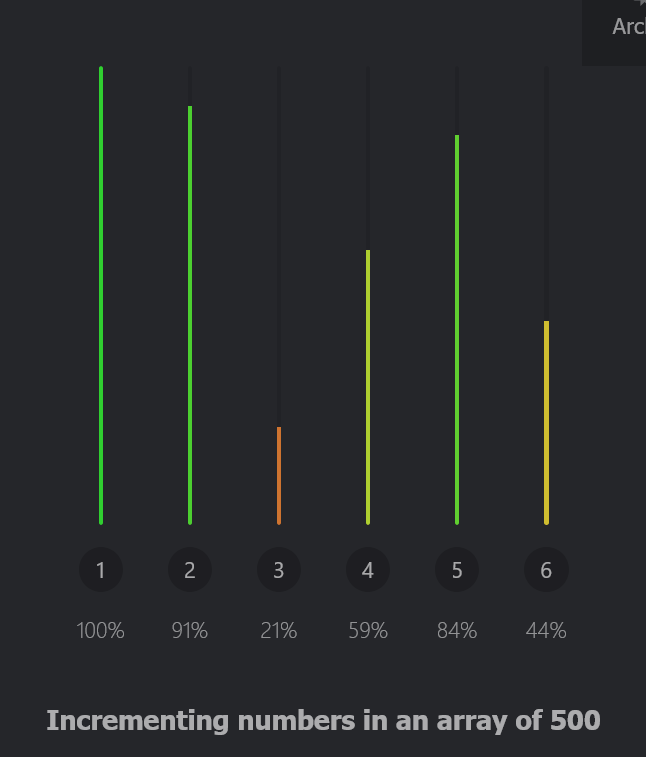
Nov 2, 2024
In the fast-paced world of web development, performance is king. Users demand quick load times and seamless interactions, making it essential for developers to optimize their applications effectively. Enter Perf.link—a powerful tool that every web developer should have in their toolkit. In this article, we’ll explore what Perf.link is, its key features, practical use cases, and why it deserves a prominent place in your development arsenal.
Perf.link is an open source performance monitoring and analysis tool (Github link to Perf.link’s repository) designed to provide developers with real-time insights into their web applications. Running small Javascript snippets and visualizing how their performance compare to each other, it allows developers to rapidly identify bottlenecks and greatly optimize their code.
One of the most common issues web developers face is slow load times. Perf.link helps you to break down, test, compare and pinpoint specific elements causing delays, whether they’re, inefficient scripts or poorly optimized APIs.
Perf.link enables you to compare performance metrics across different versions of your application on different browser engines. This is invaluable for assessing the impact of new features or optimizations before deploying them to production.
Here is a side by side comparison of how different loops perform under the same browser engine (on Firefox 132.0 64-bit), incrementing by 1 each element the following array of 500 numbers.
while loop: Repeats while a condition is true.for loop: A classic looping structure with initialization, condition, and increment.for...of loop: Iterates over iterable objects (like arrays) directly.forEach method: Executes a provided function once for each array element.map method: Creates a new array populated with the results of calling a function on every element in the original array.const numbers = [...Array(500).keys()].map(n => n + 1);
while loopconst results = [];
let i = 0;
while (i < arr.length) {
results.push(arr[i] + 1); // Increment by 1
i++;
}
for loopconst results = [];
for (let i = 0; i < arr.length; i++) {
results.push(arr[i] + 1); // Increment by 1
}
for...of loopconst results = [];
for (const number of arr) {
results.push(number + 1); // Increment by 1
}
return results;
forEach methodconst results = [];
arr.forEach((number) => {
results.push(number + 1); // Increment by 1
});
map methodconst incrementedNumbers = numbers.map((number) => number + 1); // Increment by 1
const numbersRecursion = (arr, index = 0, results = []) => {
if (index < arr.length) {
results.push(arr[index] + 1); // Increment by 1
return numbersRecursion(arr, index + 1, results);
}
return results;
};
numbersRecursion(numbers);
Here’s how well they performed against each other as of the date of this post (the closer to 100%, the better):

Interesting results, right? While it is no surprise that a standard for(1) loop was the fastest way to perform the loop, at least on my machine, .map(5) was able to be surprisingly close to a standard for(1) loop, even as a higher-order function.
Never underestimate the power of a simple optimization. Mere 500 iterations were able to show big differences in performance.
One of the coolest features of Perf.link is that once created, the benchmarks can be easily shared so you can check how it performs in different systems. The link to the benchmark above is here.
Have you ever wondered if a different piece of code could perform better than what you’re currently using? Benchmarking all your options side by side, you can choose the best one and potentially save countless hours of debugging and troubleshooting.
Perf.link simplifies the process of saving performance data for critical code, over time. This is especially valuable for assessing the long-term effects of optimizations and ensuring that your application maintains strong performance as both it and browser engines evolve.
So why every developer should use Perf.link? In today’s digital landscape, performance is crucial for the success of web applications and Perf.link offers invaluable insights that can help developers optimize their code, improve user experience, and ultimately deliver better products. By incorporating Perf.link into your development toolkit, you’ll be well-equipped to tackle performance challenges and ensure your applications stand out in a crowded marketplace.